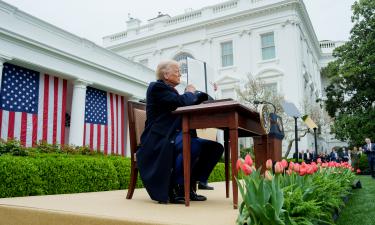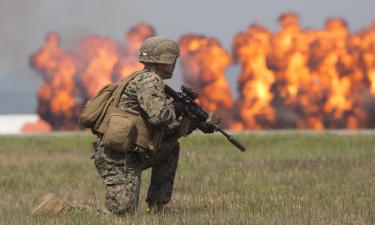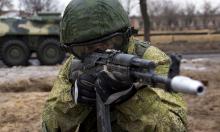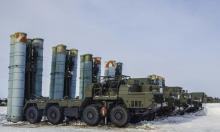Israel releases 429 Palestinian prisoners
Israel on Monday released 429 Palestinian prisoners, a gesture meant to strengthen moderate Palestinian President Mahmoud Abbas after both sides decided at last week's U.S.-sponsored Mideast conference to try to reach a peace deal in 2008.
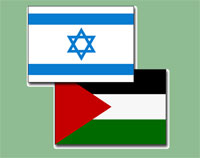
The prisoners, most of them from President Mahmoud Abbas' Fatah movement, were given a joyous welcome as they arrived at military checkpoints in the West Bank and Gaza. Cars honked horns, tearful relatives raised Fatah flags and pictures of Abbas and some carried prisoners on their shoulders.
"There's nothing better than freedom," said Salem al-Saqqa, about 30, after he reached Gaza and kissed his mother. Al-Saqa had served four years of an 11 year term, and said Abbas must do everything he can to win the relase of the thousands still imprisoned by Israel.
The prisoners had begun their journey at dawn, lining up in a courtyard at the Ketziot Prison Camp in the southern Negev Desert. Wardens and security agents sitting at tables checked names against a list, clamped handcuffs on the prisoners and put them on waiting buses heading to the West Bank and Gaza.
The Israeli prison service said it sent 408 to the West Bank and 21 to Gaza.
Parents of some prisoners said they were eager to make up for lost time.
Abdel Raouf Injas, 52, was waiting at the Beitouniya checkpoint in the West Bank to greet his son, 31-year-old Khaled, whose 12-year sentence was cut in half. Injas said he wanted to get Khaled married as quickly as possible, and said his son planned to study for a master's degree at a West Bank university.
Injas said he had two more sons in prison. "I'm feeling good, but it's incomplete," he said of the release.
Israel is holding about 9,000 prisoners. Their freedom is a central Palestinian demand, and Monday's release - the third since July - was intended to strengthen Abbas in his struggle against the Islamic Hamas by showing Palestinians that moderation pays. The vast majority of the freed prisoners were supporters are Abbas' Fatah movement.
"This release is designed to bolster moderate Palestinians," said Mark Regev, a spokesman for Israeli Prime Minister Ehud Olmert. "The peace process cannot only be summits and words, but has to be reinforced by practical measures on the ground."
Abbas' government had asked that 2,000 prisoners be freed, but Israel refused. Including the prisoners released on Monday, about 770 Palestinians will have been freed since July, a number the Palestinians find wanting.
"It's a unilateral move, and it's a very small move that does not fulfill the needs of the Palestinians," said Ashraf Ajrami, Minister for Prisoner Affairs. "We object to the prisoners' issue being dealt with like this. We want to release prisoners with long sentences."
On Sunday, Olmert damped optimism from the Mideast conference, saying Israel does not recognize the 2008 target date as a deadline.
"There is no commitment to a specific timetable regarding these negotiations," Olmert told his Cabinet, adding that before any deal could be carried out, Palestinians must halt militants' attacks against Israel.
It will be hard for Abbas to rein in militants that attack Israel from Gaza as long as Hamas rules the Gaza Strip. The Islamic militant group wrested controlof the territory from forces loyal to Abbas in June, and remain firmly in control there.
Abbas is also struggling to impose calm in his West Bank stronghold. Israel announced that it had arrested two Palestinian policemen loyal to Abbas in the shooting death of a Jewish West Bank settler last month. Ajrami told Israel's Army Radio that despite the incident, the government is "starting to institute law and order in the Palestinian territories."
Olmert's comments reflect his internal political weakness. Hard-liners have threatened to bring down his coalition government if he makes too many concessions in peace talks with the Palestinians.
In a message that could further anger Israeli hawks, Olmert's defense minister, Ehud Barak, began promoting a proposal to compensate some Jewish settlers in the West Bank who leave their homes voluntarily, according to the Defense Ministry.
The measure would apply to settlements outside Israel's separation barrier along the West Bank. The contentious barrier would enclose main settlement blocs Israel wants to retain in a peace agreement, where two-thirds of the settlers live.
The others, about 80,000, could claim compensation if they leave voluntarily. The proposal is meant to avoid the type of violent confrontations between police and settlers that Israel experienced when it withdrew from the Gaza Strip in 2005.
Olmert told Barak the proposal merits review, but officials in the prime minister's office said there was no plan to submit it to Cabinet for discussion in the near future, a participant in the meeting said.
Settler leaders condemned the proposal. They oppose any building freeze or evacuation of settlements, even unauthorized settlement outposts that dot West Bank hilltops.
The violence from Gaza that Olmert spoke out against led to clashes between militant squads and Israeli troops on Sunday and early Monday.
Israeli ground forces retaliating for mortar attacks on southern Israel targeted a mortar squad in Gaza City late Sunday, and Hamas and hospital officials said one militant was killed.
Early Monday, three Hamas fighters were killed in clashes with Israeli troops in northern Gaza, the group said. The military said troops saw gunmen approach the security fence that separates Gaza from Israel, opened fire, and identified a hit.
In Gaza, gas stations closed down Sunday after owners refused to accept the reduced amounts of fuel offered by Dor Alon, the Israeli fuel company that supplies Gaza.
Gas station owners blamed an Israeli decision to cut back on fuel supplies, but Dor Alon officials said Thursday they were cutting back because the Palestinians have not paid their bills.
"We ask our Palestinian people to be patient and not to hurry to go the stations and ask for fuel," said Mahmoud al-Khozondar, a representative of the owners. "I think God will help us first."
Hamas officials blamed the Abbas government for not paying the fuel bills, warning that the reduction could trigger a health crisis.
Also Sunday, Palestinian Planning Minister Samir Abdullah said the Abbas government would ask donor countries for $5.5 billion (Ђ3.7 billion) in aid for 2008-2010, or nearly double the current annual level. Donors will meet in Paris on Dec. 17.
Subscribe to Pravda.Ru Telegram channel, Facebook, RSS!

